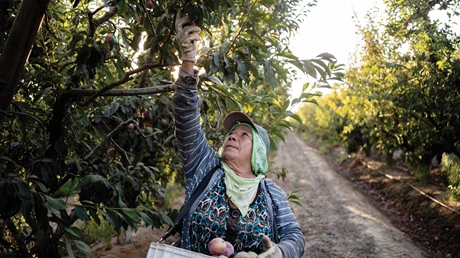
In early spring, the coronavirus pandemic sent the global food supply chain into disarray. In US grocery stores, prices surged, and many items—not just toilet paper—simply disappeared from shelves.
At some fruit and vegetable farms across the country—particularly those that sell directly to consumers or stores—business remained strong or even improved. But other farms watched the market for their produce dry up overnight, forcing them to cut operations, pull acreage out of production, and endure the heartbreak of tilling harvest-ready crops into the ground.
At the base of this teetering agricultural system are migrant farmworkers. Just under 10 percent of laborers come to the United States on H-2A visas, which allow them to work in agriculture for up to 10 months. The other 90 percent of seasonal farmworkers live domestically and often earn minimum wage, patching together jobs in hospitality, restaurants, and a rotating schedule of crops. Nearly half are not authorized to work in the United States.
For many workers, the pandemic has made an already difficult living even more daunting. Growers and packing houses laid-off workers. The virus moved quickly through some farms and buildings that house agricultural workers, many of whom don’t have health insurance.
CT met with pastors, farmers, field workers, and activists in California and North Carolina who were ministering to migrant farmworkers before the pandemic and continue to do so today. In ministries of word, mercy, and justice, these Christians are approaching the complex challenges facing laborers in ways that are varied and, at times, even contradictory.
Word
San Joaquin Valley, California
The sun had not fully risen when Tom Rios sat down with the men in his morning Bible study. To accommodate the schedules of the workers who participate, the study convened at 5:30 a.m. Today, they were meeting in Rios’s backyard just outside of Kingsburg, California, nestled between fields and orchards along the banks of the Kings River.
They discussed Romans 1:16–17. Christ alone, Rios explained in Spanish, is sufficient to satisfy a just God. He is the only mediator between God and man.
“No hay otro,” Rios said. “No hay otro.”
José Macias nodded along. This truth changed his life, he said later. He works for an irrigation company, pumping water to the fruit orchards that …
News brought to you by Christianity Today




